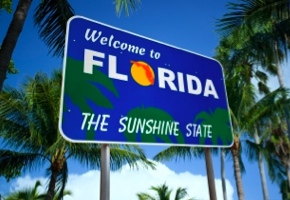By Julie Lundin, LEED-AP ID+C,
Principal, Emerald Skyline Corporation
Florida is undeniably sunny. “The Sunshine State” was adopted as the State Nickname in 1970. It is used on  motor vehicle licenses, welcome signs and marketing campaigns. While Florida promotes itself as the Sunshine State we are not utilizing our most abundant and natural resource, solar power.
motor vehicle licenses, welcome signs and marketing campaigns. While Florida promotes itself as the Sunshine State we are not utilizing our most abundant and natural resource, solar power.
What is solar power? It is energy from the sun that is converted into thermal or electrical energy. Solar energy is the cleanest and most abundant renewable energy source available. The U.S., including Florida, provides some of the richest solar resources in the world. Only two other states, California and Texas, have more rooftop solar power potential than Florida, according to the U.S. Department of Energy. Based on Florida’s size, rebounding economy and growing population our state should be a leader in the generation and promotion of solar energy.
So why isn’t Florida a solar energy leader?
The reason is simple: Florida’s large utility monopolies and lawmakers have worked successfully to block and control who can generate solar energy and what it can be used for; thereby restricting its use by homeowners and businesses. Florida utility monopolies exist today due to a law that was created over 100 years ago which was trying to avoid a tangle of power lines strung up by competing companies. This same law restricts solar companies from installing solar panels on roofs and selling back electricity. It is considered a third party sale and is illegal in Florida.
- Florida is now only one of four states in the nation that prohibit citizens from buying electricity from companies that will put solar panels on a building.
Due to the influence and power of Florida’s utility monopolies, there is a large effort to discourage renewable energy in the state. The large utilities are afraid of losing their monopoly and the lucrative profits that the government guarantees them. Recently lawmakers, at the direction of the utility companies, gutted the State’s energy savings goals and entirely eliminated Florida’s solar-rebate program.
Floridians should have access to solar power and free market choices. We should be allowed to contract directly with solar providers to power our homes and businesses with solar energy. We are currently being denied the right to choose solar as a power source. The free market and competition benefits all of us. Solar energy makes financial sense. That is why business leaders in America’s brightest, most competitive companies are increasingly choosing to install solar energy systems at their facilities. The price of solar energy has fallen dramatically over the past few years while the price of fossil fuel generation continues to experience volatility. America’s businesses are turning to solar power because it’s good for their bottom line.
- According to a report by the Solar Energy Industries Association, Walmart is the top corporate user in the United States with 105 MW installed at 254 locations.
- The average price of an installed commercial PV (photovoltaic) project in 2Q2014 was 14% less than the cost in 2013 and was over 45% less than it cost to complete in 2012.
Electricity costs represent a significant operating expense, and solar provides the means to reduce costs and hedge against electricity price increases.
- The Solar Means Business report noted that the top 25 companies for solar capacity had more than 569 MW of solar PV at 1,110 different facilities in a survey conducted last August. These results represent a 28% increase over the prior year and a 103% increase over 2012.
Clearly, solar power is a great untapped resource for the Sunshine State – one that can benefit residents as well as businesses. It is time to enable Floridians to have unfettered access to this inexpensive energy source – and you can help in the process:
The Florida resident-led solar group, Floridians for Solar Choice, is seeking to make solar more accessible in the state. They are seeking your signature on a ballot petition.
- The petition seeks to expand solar choice by allowing customers the option to power their homes or businesses with solar power and chose who provides it to them.
Floridians for Solar Choice have reached 72,000 signatures on their petition which clears the way for it to be reviewed by Florida’s Supreme Court.
- The Supreme Court will decide whether or not the petitions language legally qualifies it to be a ballot initiative for Floridians in 2016.
Getting its petition on the 2016 ballot is the main goal for Floridians for Solar Choice. They need over 600,000 more signatures to have this critical citizen initiative to be put on the ballot for next year.
Please visit their website to learn about the solar initiative to remove this legal barrier to making Florida the Sunshine State again, and, more importantly, to sign the petition, go to: www.FLsolarchoice.org.

